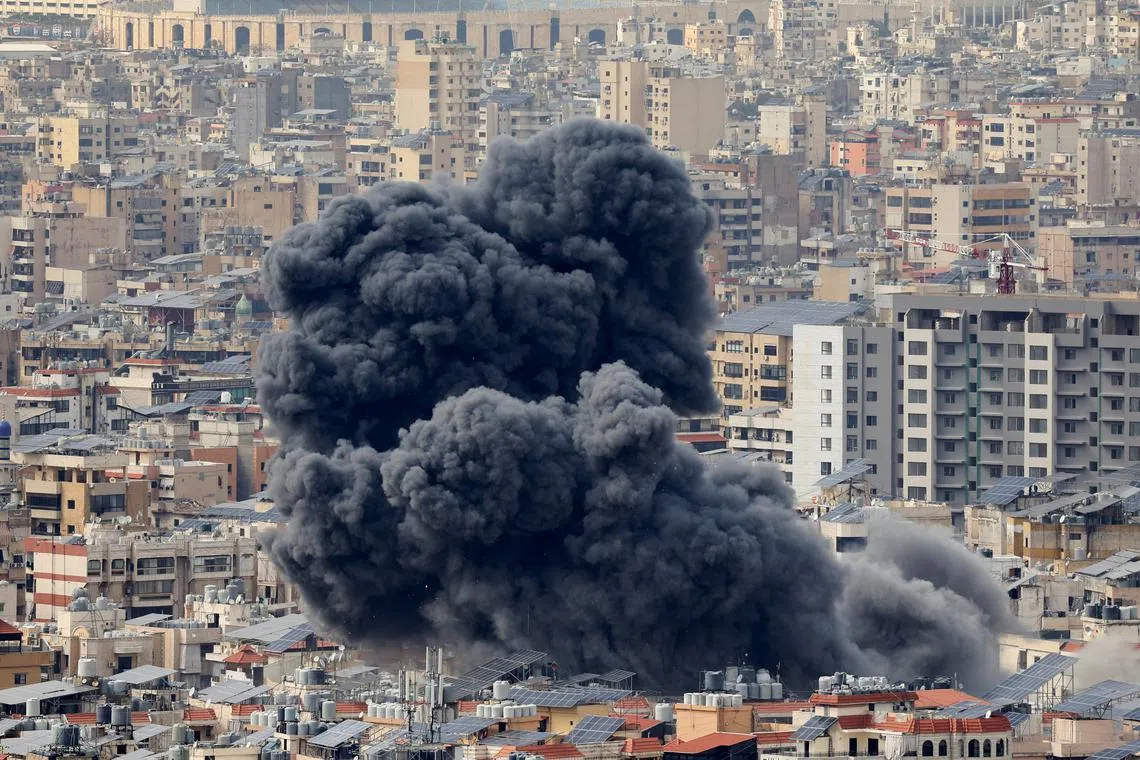Israel hits building in Beirut’s southern suburbs, first since truce
Sign up now: Get ST's newsletters delivered to your inbox

Smoke billows over Beirut's southern suburbs following Israeli strike after issuing an evacuation warning for the area.
PHOTO: REUTERS
Israel’s air force conducted a large strike on a building in the southern suburbs of the Lebanese capital on March 28, a Reuters reporter said, the first heavy bombardment there since a truce deal in November ended a war between Israel and Hezbollah.
Israel’s military said it hit a drone storage facility in the area belonging to Iran-backed armed group Hezbollah.
The strike, which was heard across Beirut and produced a large column of black smoke, followed an evacuation order by the Israeli military for the neighbourhood and three smaller targeted drone strikes on the building intended as warning shots, security sources told Reuters.
The evacuation order sent residents of the area into a panic, rushing to escape on foot as traffic clogged the streets out of the area, Reuters reporters in the area said.
Beirut’s southern suburbs, a Hezbollah stronghold known as Dahiyeh, were pounded in 2024 by Israeli strikes that killed many of the group’s top leaders, including its powerful chief Sayyed Hassan Nasrallah in a September air attack.
A US-brokered truce in November put an end to the fighting and mandated that southern Lebanon be free of Hezbollah fighters and weapons, that Lebanese troops deploy to the area, and that Israeli ground troops withdraw from the zone.
But the truce has been shaken over the last week by two cases of outgoing fire from southern Lebanon – several rockets fired on March 22 and another set fired on the morning of March 28.
Israeli Defence Minister Israel Katz said on March 28 the Lebanese government must enforce a ceasefire agreement between Israel and the Hezbollah movement on its side of the border, or Israel would continue to conduct attacks.
“I am sending a clear message to the Lebanese government: If you do not enforce the ceasefire agreement, we will enforce it,” he said in a statement after Israeli aircraft hit targets in Beirut.
Israeli ministers have vowed to ensure that the tens of thousands of Israelis who evacuated their homes in border areas when Hezbollah began bombarding the area in 2023 would be able to return safely.
But with more Israeli units deployed around Gaza, where a separate ceasefire has also broken down, it remained unclear whether Israel was prepared for any wider intervention.
Hezbollah has denied links to either attack. No other group has claimed responsibility.
But Israel’s statement confirming its raid on Dahiyeh said that the rocket fire on March 28 “constitutes a blatant violation of the understandings between Israel and Lebanon and a direct threat to the citizens of the State of Israel”.
It added that the Lebanese state bears responsibility for upholding the agreement.
Israel also bombarded Hezbollah targets in south Lebanon on March 28 after intercepting the incoming rocket fire, the Israeli military said.
Israel has vowed a strong response to any threats to its security, prompting fears that 2024’s conflict – which displaced more than 1.3 million people in Lebanon and destroyed much of the country’s south – could resume.
Lebanese President Joseph Aoun, in Paris to meet his French counterpart Emmanuel Macron, said in a written statement from France that the onus was on the international community to “put an end to these attacks and force Israel to abide by the agreement, just as Lebanon is committed to it”.
Mr Macron said there had been no activity justifying Israel’s strikes and that he would call US President Donald Trump and Israeli Prime Minister Benjamin Netanyahu to discuss the attacks.
“The framework agreed upon by Lebanon and Israel was not respected today by Israel, unilaterally, and without us having either information or proof of the triggering event,” Mr Macron said.
The United Nations Special Coordinator for Lebanon Jeanine Hennis-Plasschaert said the exchange of fire across the southern border on March 28 was “deeply concerning”.
“Any exchange of fire is one too many. A return to wider conflict in Lebanon would be devastating for civilians on both sides of the Blue Line and must be avoided at all costs,” she said in a written statement. REUTERS


